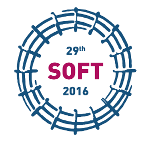Speaker
Sebastian Friese
(Institut für Energie- und Klimaforschung)
Description
The shutter mechanical concept for the ITER core plasma CXRS Fast Shutter is based on elastic bending of a deformable arm structure (length ≈ 1.8 m) which blocks or opens the path of plasma emitted light aiming at the diagnostics first mirror. Bending of the shutter arms is induced by an actuator and will be restrained using the limiting bumpers, where, although the arms are preloaded against the bumpers, the mechanical shock excites arm rebounds followed by free oscillations. A simplified parametric shutter mock-up is used as an experimental test device for evaluation of the dynamic behaviour. Since the dynamic response of the shutter is strongly dependent on the bumper system and the pressure evolution of the pneumatic actuator, in-situ measurements are essential to study the interaction of shutter, actuator and bumper as one system. The purpose of the parametric mock-up is to investigate the dynamic behaviour by means of a simplified model where the effect of parametric changes on the key natural frequencies important for functional movement can be calculated analytically. Furthermore, the parameters of mechanical dynamics (preload, stiffness and mass distribution) are used to adjust the dynamic behaviour for optimisation during the experimental tests. Goal of the shutter dynamics adjustment is to minimise arm rebound amplitudes and duration, which can be reached through low impact kinetic energy and also by appropriate bumper material selection. The results of experimental tests and dynamic numerical simulations are compared and used for optimisation of the shutter dynamics. Beside the experimental and numerical studies, the outline of the mock-up test programme, including an experimental setup with laser displacement sensors, fast camera and load cells, is presented in this paper.
Co-authors
Anatoly Panin
(Institut für Energie- und Klimaforschung, Forschungszentrum Jülich GmbH, D-52425 Jülich, Germany)
Philippe Mertens
(Institut für Energie- und Klimaforschung, Forschungszentrum Jülich GmbH, D-52425 Jülich, Germany)
Sebastian Friese
(Institut für Energie- und Klimaforschung, Forschungszentrum Jülich GmbH, D-52425 Jülich, Germany)
Yury Krasikov
(Institut für Energie- und Klimaforschung, Forschungszentrum Jülich GmbH, D-52425 Jülich, Germany)

